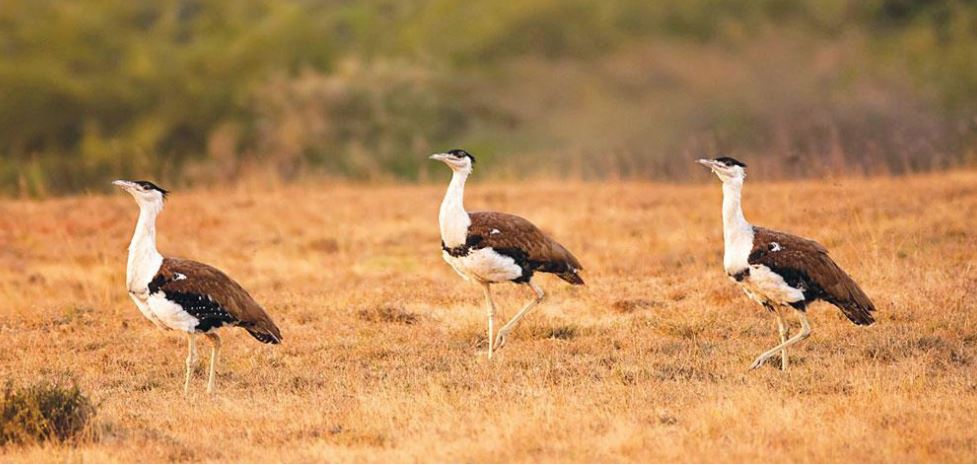The National Green Tribunal has directed the installation of “bird diverters” on power lines on a priority basis in order to protect the critically endangered Great Indian Bustard (GIB).
The NGT said, “Since the main reason for mortality of the GIBs is the collisions with power lines laid by the Wind/Solar Energy projects, crisscrossing their paths and under-grounding of transmission lines is not viable for the projects already completed, installation of the bird diverters to prevent such fatalities needs to be undertaken on priority basis expeditiously, preferably within four months.”
It has further directed, “Under-grounding of transmission lines needs to be insured for all new projects henceforth, as recommended by the six-member expert committee, by making it mandatory condition for grant of consents under the Water/Air Acts by the concerned State PCBs which may be overseen by the CPCB and the MoEF&CC.”
“If consent is not required, even then under-grounding of transmission lines may be ensured. While granting such consents, impact of such projects on biodiversity of the area, specially in the context of GIBs, be undertaken,” the Tribunal said.
It has directed the MoEF&CC/CPCB/State PCBs to take further action as per the plan suggested by the six-member committee appointed by the Tribunal itself.
The directions are passed by the Principal Bench of National Green Tribunal headed by the Chairperson Adarsh Kumar Goel, S.K. Singh (Judicial Member), Dr. S.S. Garbyal (Expert Member) & Dr. Nagin Nanda (Expert Member), in the matter for protection of Great Indian Bustard (GIB)-rare bird and one of the critically endangered species. “Centre for Wildlife and Environment Litigation Vs Union of India & Ors”
The applicant has submitted that the population of GIB has steadily declined by 75% in the last 30 years. The main reason for such decline is fatal accidents with the power lines. This requires habitat improvement and conservation breeding. In the course of reviewing the project “Habitat Improvement of Great Indian Bustard-An Integrated Approach” of the MoEF, in a review meeting on 19/07/2018 it was noted that the wind projects did not require any EIA studies. There was also no substitute mechanism to ensure safeguards for protection of such birds on ‘Precautionary’ principle of Environment.
As per the previous orders of the National Green Tribunal, the MoEF&CC has constituted a joint Committee of Six-Members and submitted its report on 22/12/2020, for the Conservation of Great Indian Bustard. The Committee was comprised of the following officials;
1- Director General of Forest, MoEF&CC- Chairperson
2- Additional Director General of Forest (Wildlife), MoEF&CC- Member Secretary
3- Nominee of Ministry of Power, Govt. of India.
4- Nominee of Ministry of New and Renewable Energy, Govt. of India.
5- Nominee of Energy Department of Gujarat.
6- Nominee of Energy Department of Rajasthan.
The Committee has suggested various measures and informed that the framework of the action plan has already been finalised but due to this Covid pandemic, they require six months time to finalise the action plan for GIB Conservation.
The Court has considered the report submitted by the Committee and directed it to finalise the proposed action plan within two months.
On one of the applications filed by the National Solar Energy Federation of India (NSEFI), the NGT was apprised that a similar matter was pending before the Supreme Court on the subject of an emergency response plan for protection and recovery of the GIBs. The applicant submitted that since the Supreme Court has taken cognizance of the matter and the order of the Tribunal will impact projects for generation of Solar & Wind energy which will be helpful for generating non-fossil energy to advance the Paris Agreement.
The National Green Tribunal has said,
“We do not find any conflict in the order of this Tribunal and consideration by the Hon’ble Supreme Court. There is also no conflict with the projects for the generation of non-fossil energy. Protection of critically endangered species like GIBs cannot be ignored on the specious plea put forward by the NSEFI.”
Also Read: Kerala HC says AICTE can prescribe recruitment mode but it can’t be with retrospective effect
The Court disposed of the matter with a direction that necessary steps be taken for protecting critically endangered GIBs by installing the diverters on all existing power-lines, as suggested by the six-member Committee of the MoEF&CC. Monitoring of compliance be done, preferably by the Wildlife Institute of India at least twice a year.
Great-Indian-Bustard

